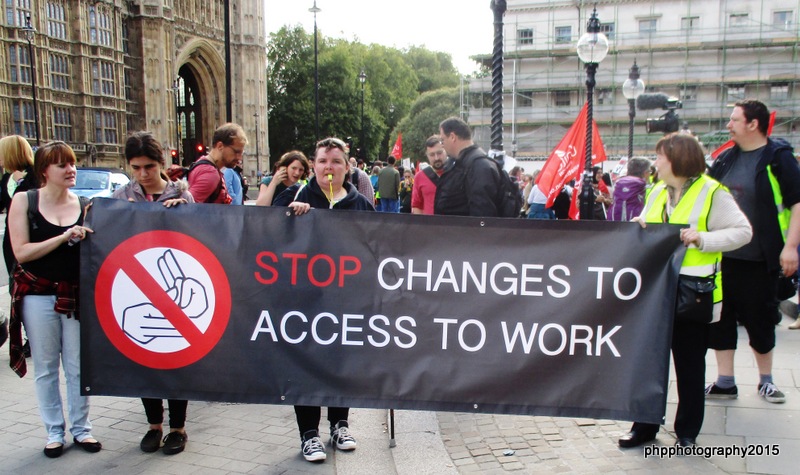Stop Changes to Access to Work – guest post from Geraldine O’Halloran
When AtW works well it’s a brilliant support, ensuring those of us who need it can have the right support to let us get on with the jobs we have. But, like many good ideas – someone had to come along and spoil it. Guest post from Geraldine O’Halloran from the StopChanges2ATW campaign.

Protesters on the Stop Changes 2 ATW march on 29 September 2015This is a guest post from Geraldine O’Halloran from the StopChanges2ATW campaign.
The StopChanges2AccesstoWork (SC2AtW) campaign began in 2014; originally to be a short 3 months piece of work highlighting Deaf and Disabled concerns about the way DWP were messing with their Access to Work (AtW) budgets. When it began, this campaign, initially, it was to focus on how DWP was reducing and/or cutting Deaf/BSL users and hearing-impaired people’s communication support budget. In many cases this was done without informing D/deaf people of changes being made. We found that it was not only Deaf people experiencing cuts or changes to their support, the outcome was it caused a great deal of worry and stress and damaged a lot of Deaf and Disabled peoples’ experiences in the work place.
For those who are not sure what Access to Work is – it provides support to enable Deaf and Disabled people to take up and retain paid employment. It can be payments for aids, adaptations and support such as BSL interpreters, Support Staff, work-related travel costs etc.
When AtW works well, it’s a brilliant support, ensuring those of us who need it can have the right support to let us get on with the jobs we have. But, like many good ideas – someone had to come along and spoil it.
In October SC2AtW launched a report called “Barriers to Work” outlining Deaf and Disabled Peoples experiences of using AtW and making a number of important recommendations on improving AtW resources and support. The report was the accumulation of a survey we carried out in 2015/2016 asking Deaf and Disabled People to tell us their experiences of using AtW support, what type of support they received, how many hours of support they got plus their experiences of using AtW.
Deaf and Disabled People told us about a catalogue of failures and concerns where their AtW budgets for support staff, communication staff was being cut or reduced; invoices for work completed are not being paid; work related equipment not arriving months after assessment and approval has been given. They were told these cuts to support packages was related to cost effectiveness; protecting the public purse; using terms like “too expensive”, need to make savings or related to “new rules” – (which no one know anything about), making Deaf and Disabled people feel like a expensive burden.
But, what is not mentioned, from research carried out in 2004, that for every £1.00 spend on AtW there is a net return of £1.48 to the Treasury. This does not include the benefits of having a thriving and motivated group of Deaf and Disabled people in employment, not accessing to state benefits and related services.
The recommendations in the “Barriers to work “ report: ask for a commitment to the Access to Work programme; that the aim of AtW must be to level the playing field; acknowledge that Deaf and Disabled people are the experts of their own conditions and know our access needs better than anyone else; that the support we receive should focus on our abilities and potential and not disadvantage us; put Deaf and Disabled people at the centre of the AtW process; reduce delays and improve communication; remove the cap which limits the amount Deaf and Disabled people can receive, especially those in senior management roles who need a higher level of support available.
We began our campaign three years ago – unfortunately we are still here and will continue until DWP and the Government stop creating so many barriers to our jobs and working life that continue to leave many Deaf and Disabled people in despair.